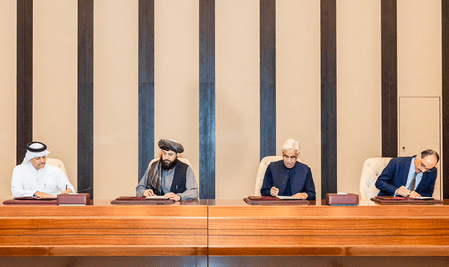New Delhi, Nov 8 (IANS) Another attempt by regional negotiators to get Afghanistan and Pakistan to agree on a peace plan reportedly ended in a deadlock in Istanbul amid renewed fighting between the two countries. Both sides appear to be guided by mutual distrust, with pride and efforts at justifying individual stands overshadowing any other issue. The outcome once again has raised questions over regional stability.
The trust deficit was apparent even as the negotiators were preparing to leave for Istanbul, venue for the third round of talks mediated by Qatar and Turkey, when Pakistan’s Defence Minister Khawaja Asif questioned the Taliban government’s “independent authority to hold talks”. He continued to blame India for influencing Kabul instead of trying to rebuild the bridge with the Taliban, which was once Islamabad’s ally.
While the second day of the current session was coming to an end on Friday, November 7, Asif announced “a complete deadlock” while speaking to Pakistan media, adding “the negotiations have entered an indefinite phase”. He told viewers that the Afghan delegation had come “without any programme” and would not sign a written pact.
At the heart of the impasse lie several irreconcilable priorities. Islamabad demands Pakistani militants based in Afghanistan — particularly elements of the Tehreek-e-Taliban Pakistan (TTP) and allied networks — be decisively dismantled, and wants a written, verifiable mechanism to prevent cross-border strikes.
Islamabad now desperately needs to address national security and design a domestic political survival. Several uprisings — from Baluchistan to Pakistan-occupied-Kashmir — within the country have sparked public outrage and put pressure on the military and civilian leaders to produce results.
Meanwhile, the Taliban has rejected what it sees as Islamabad’s attempts to dictate internal Afghan security measures, arguing that Kabul will not act as a policing agent for Islamabad or sign open-ended commitments that could be used to justify foreign intervention.
The Taliban has emphasised that action against militant networks must be based on Afghan law and sovereignty, while also pointing to Pakistani incursions and artillery fire that Kabul says undermined the negotiations.
A second major problem is verification. Islamabad sought written, monitorable commitments and a mechanism for third-party verification, which the Afghan side viewed as an infringement on its independence. The resulting mismatch meant neither side could bridge the trust deficit in Istanbul.
The Afghan Taliban has repeatedly denied any involvement in hosting the Pakistan-Taliban or abetting terror attacks across the border. A written undertaking would mean justifying Islamabad’s allegations of Kabul’s involvement in covert operations against Pakistan.
Another issue that hangs over the dialogue is the repatriation of Afghan refugees. With Pakistan opening a floodgate of returnees, evicting thousands from its land, the Taliban is inundated by the sheer volume. Even international agencies are requesting Islamabad to control the flow, but to no avail.
While Pakistan described the talks as effectively over, the Taliban and the Afghan state media framed the outcome differently, stressing the fragile ceasefire but rejecting Islamabad’s principal demands. The two sides had agreed to a ceasefire and the establishment of mechanisms to consolidate peace and stability in the first round of negotiations held in Doha in October this year.
They also agreed to hold follow-up meetings to ensure the sustainability of the ceasefire and verify its implementation reliably and sustainably, thus contributing to achieving security and stability in both countries. However, two subsequent rounds in Istanbul ended in a stand-off, exposing deep mistrust, diverging security priorities, and conflicting domestic pressures.
The day the third round of dialogue was scheduled to resume (November 6), Pakistani and Afghan forces exchanged fire at the Spin Boldak-Chaman border crossing in Afghanistan’s Kandahar province. Both sides traded allegations, accusing each other of initiating the attack.
Meanwhile, mediators from Qatar and Turkey are reported to have expressed disappointment with the talks ending in a stalemate, increasing regional tensions.
–IANS
jb/skp
Disclaimer
The information contained in this website is for general information purposes only. The information is provided by BhaskarLive.in and while we endeavour to keep the information up to date and correct, we make no representations or warranties of any kind, express or implied, about the completeness, accuracy, reliability, suitability or availability with respect to the website or the information, products, services, or related graphics contained on the website for any purpose. Any reliance you place on such information is therefore strictly at your own risk.
In no event will we be liable for any loss or damage including without limitation, indirect or consequential loss or damage, or any loss or damage whatsoever arising from loss of data or profits arising out of, or in connection with, the use of this website.
Through this website you are able to link to other websites which are not under the control of BhaskarLive.in We have no control over the nature, content and availability of those sites. The inclusion of any links does not necessarily imply a recommendation or endorse the views expressed within them.
Every effort is made to keep the website up and running smoothly. However, BhaskarLive.in takes no responsibility for, and will not be liable for, the website being temporarily unavailable due to technical issues beyond our control.
For any legal details or query please visit original source link given with news or click on Go to Source.
Our translation service aims to offer the most accurate translation possible and we rarely experience any issues with news post. However, as the translation is carried out by third part tool there is a possibility for error to cause the occasional inaccuracy. We therefore require you to accept this disclaimer before confirming any translation news with us.
If you are not willing to accept this disclaimer then we recommend reading news post in its original language.

